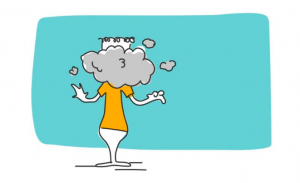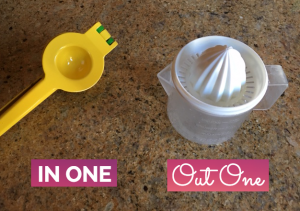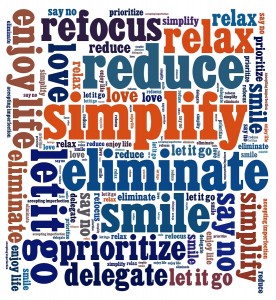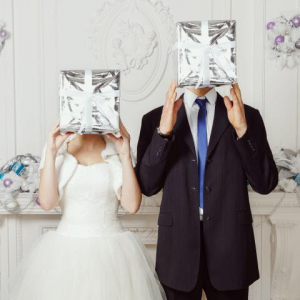Let’s start with what happens when you have a lack of organized space. Disorganization creates a feeling of being crowded and out of control of your things, which leads to lack of mental clarity.

Let’s take a personal poll:
1) Do you spend too much time looking for your stuff?
2) Do you feel like you are always in a rush?
3) Do you feel like your space does not support what you want to accomplish?
If any of the these sound familiar, then imagine your work space right now. Perhaps it is your desk or another place where you do most of your mental work, you know, the stuff that you need to get done every day. Take a moment and imagine you sitting down, about to get to work on a big project.
Do you feel like it is inviting you in and you are excited to get your work done or are you repelled by what it looks like? A space that repels, doesn’t support you to do your best work. A space that is inviting creates calm and clarity and allows you to be productive.
Creating an inviting, supportive space is different for each person. Yet, it comes down to the same thing for everyone. Choose to surround yourself with only things that you need and you love. That’s hard to do, because we all get attached to our stuff, however; when you create more space by having less stuff, you will feel more focused and in control.
While there is no end to the amount of information about how to manage time, I would strongly argue that it’s not about managing time, it’s about managing tasks. The difficulty comes from having too many tasks. Our plates are full with things to do all the time and this leads to brain fog, overwhelm and that feeling of being out of control.
Have you had one of those crazy busy days; where you’re running around doing a hundred different tasks and spending half that time attempting to do more than one task at a time? This is how we fall into the fallacy of multi-tasking. By the end of the day, you end up feeling exhausted and wondering what you did all day.
The solution is to create a system. And if you are rolling your eyes or shaking you head because you tried a system and it did not work, try again. Systems are NOT a one-size fits all solution. You often have to try different ones and one of the keys is to know what does and does not work for you. You need a system customized for you according to how you think, live and work.
Ah, Freedom- even the word sounds nice. When you have too much stuff surrounding you or you have too much to think about, freedom is the last thing you have. Instead you experience confusion, chaos and a lack of control. None of us wants that in our lives. This is the opposite of freedom and definitely does not give us mental clarity.
– – – – – – – – – – – – –
Mental clarity comes from creating a physical space that allows you to feel supported because you have surrounded yourself with stuff that you need and that brings you joy. Clarity comes from having a system to organize your tasks so you feel in control of how you spend your time. The knowledge that you are in control of your space and time creates FREEDOM. And at the end of the day, each of us wants the clarity and freedom to create the life and business that we truly want.
If you’ve ever wondered, do organizers really practice what they preach?
I am here to say, YES! In my case, I follow 4 basic rules*:
1. Decide where things live
2. Return items to their “home”
3. Follow In One/Out One
4. Build routines around maintaining systems
 The third rule, In One/Out One, is the least appreciated and most neglected by our clients, even though it offers the best defense against clutter build-up.
The third rule, In One/Out One, is the least appreciated and most neglected by our clients, even though it offers the best defense against clutter build-up.
Here’s a personal story of how it recently went down in my house.
First you have to know that I LOVE citrus. Fresh lemon juice goes into every salad dressing. Fresh lime juice refreshes most fruit bowls. Many of my fish recipes require fresh lemon, lime or orange juice. So my juicer has been a staple in my kitchen. I love that it not only does a great job, it also attaches to a measuring cup – which makes it easy to know when I have enough.
Pictured below on the left, it had a primo spot in my most accessible gadget drawer just below my prep counter. Until…
 My husband, an aspiring minimalist, bought me a new juicer. He had researched to get me “the perfect gift.” I was skeptical, even though for him to buy something it MUST be great. I could not imagine HOW anything could replace my beloved juicer.
My husband, an aspiring minimalist, bought me a new juicer. He had researched to get me “the perfect gift.” I was skeptical, even though for him to buy something it MUST be great. I could not imagine HOW anything could replace my beloved juicer.
It would have to at least be:
• super easy to use
• simpler to clean
Well, my new citrus press is all that AND bold and bright. In being so colorful — I smile every time I see it.
 But it took me some time to let go of my trusted fave…2 weeks, in fact. I call it the testing time. Some “old” items deserve this reflective time.
But it took me some time to let go of my trusted fave…2 weeks, in fact. I call it the testing time. Some “old” items deserve this reflective time.
Honestly, it took me a week to open the package and try the new “citrus press.” I felt like I was cheating on my trusted go-to.
Once, I tried it, I set an alarm on my calendar to remind me to “consider if keeping new juicer” and a few days later “decide if still need old juicer.”
When you replace something, even if you are committed to In One Out One, you don’t HAVE to let go immediately. But you must put a time limit on making your decision. (It’s too easy for items to stagnate, clog your drawers and attract more clutter.)
Since I was using these gadgets daily, it didn’t take long to know I was in love. As for my “old” juicer, it still has life left in it. My son is a decent cook at college — so guess who just inherited a new fave? 🙂 When he graduates, I will gift him his very own citrus press!
* Remember I said these were 4 rules that I think every Professional Organizer follows?
It’s true of any organized person.
• You don’t have to be a professional organizer to be organized.
• Some people are MORE organized than their organizer (GASP!)
Yes…it’s true. Not every organizer is the MOST organized person you’ll ever meet.
• Professional Organizers know how to help YOU solve your organizational overwhelms and clutter-crisis.

My birthday is Ground Hog’s Eve (Feb 1st). That means I get a do-over for whatever New Year’s Resolutions I haven’t followed through with. I get to make new resolutions for what I want to change before my next birthday. But this year I decided not to make resolutions. I decided to set intentions instead.
Resolutions too often include words like “don’t, won’t or never.” Intentions are focused on the future and can be stated in the present tense every day. After my morning meditation, I frequently set an intention to be grounded and focused throughout my day.
Intentions can become habits. A habit is defined as “an addictive behavior that is hard to give up” but an addiction does not need to be viewed negatively. For example, I am addicted to my grandchildren. The more time I spend with them the more time I want to spend with them.
What would happen if I became addicted to new habits? To become addicted, the first thing I need to do is to explore how I will benefit from my new habit. In sales, we are taught that when we convey the benefit first, ask key questions that lead our prospect to reply “yes” or to nod their head affirmatively, the close will take care of itself.
In December I set an intention to allow more time to get places and not squeeze one more thing in before getting out the door. Then I decided I couldn’t wait until January to put this into action because rushing to get out the door was stressing me out and negatively affecting everyone around me.
It isn’t an intention anymore; it’s a new habit. The benefit of allowing myself more time to get places and get out the door on time is that I don’t feel stressed about forgetting something important or anxious about being late. I am more grounded and focused throughout my day.
Habits create different types of energy. Good habits create positive energy that flows. “Bad” habits create problems like clutter and disorganization; a stagnation of energy, productivity and efficiency.
As a Home Organizer I look for the cause of the clutter and chaos in a space and often I see it is because of “bad” habits like not processing junk mail or not breaking down cardboard boxes when they are empty. When I am finished with a client, I make recommendations to help them to create new habits that will keep the clutter from re-accumulating and will maintain the serenity that organization has created.
One of the biggest challenges in life is to walk your walk and talk your talk. I intend to do that starting now and not wait until New Year’s Eve or Ground Hog’s Eve.

I am a parent of two older teens, one in the first year of college and one in the later years of high school. As an organizer, my kids grew up with structure and routine, in hopes of them learning to be organized as adults. Our home was organized, our mornings ran fairly smoothly, and homework was completed without any issues. There were a few sticky points, such as screen time and bed time, but for the most part, our daily lives ran smoothly overall.
Now that they are older, the organizer mom in me still wants to help them be the most efficient they can be. But the cognitive side of my brain knows that now is the time to let go, and let them make their own decisions. I should only help them when they ask me for it. However, it is very difficult for me to sit back and watch them make mistakes such as scheduling two events for the same time, or running late for something. But I know the only way they will learn is by my stepping back and giving them the control to manage their own time, schedules, and things. They will make mistakes, and learn from them.
As hard as this is for me to let things go, I am getting better at it. I still sometimes find myself jumping in when I shouldn’t, and they both let me know when I am intervening where I shouldn’t be. I just take note of this, and try to not make that mistake again in the future.
I am sure I am not alone, being a parent during this transitional time. I wish all of you the inner strength and patience to step back, and let your teens develop into the wonderful young adults we all want them to be!

As an ADHD specialist, I frequently have the privilege of meeting couples where one partner has ADHD (or ADD). As they lead me on a tour of their home, it’s not infrequent that the spouse without ADD makes comments such as, “I don’t understand why she can’t keep this place tidy!” or “He’s attached to everything and refuses to throw anything out!”
I feel immediate compassion for the accused partner. Having ADD is challenging enough; living with someone who refuses to accept the diagnosis or has little understanding of the brain-based disorder adds another layer of difficulty.
I’m not a therapist but if given the opportunity, I like to point out the wonderful qualities of their ADD mate. Chances are, if you have ADD you possess a host of awesome qualities. Maybe you’re creative, a talented singer or writer. Perhaps an academic or a super successful salesperson. You probably have a wonderful, warm and bubbly personality which attracted your mate to you initially. Alas, as the years go by, the partner without ADD starts to focus on your lack of focus, disorganization, your tardiness or other weaknesses.
There are many well-written books on ADHD. If you’re reading this and the above scenario feels oh so familiar, I recommend my all-time favorite book, Delivered from Distraction by Edward M. Hallowell, M.D., and John J. Ratey, M.D. Hallowell (who has ADHD) focuses on the positive, on the huge potential of the person. I find his approach refreshing and helpful to both partners.
What if you’re still single and looking for love? Hallowell dedicates a whole chapter to describing what kind of mate is best if you have ADHD. Here’s a short excerpt that brings tears to eyes each time I read it:
“Someone who loves you for who you are. Someone who gets a kick out of you. Someone whose voice lifts when he/she hears it is you on the other end of the line. It is helpful if the mate can educate (him)herself about ADD and not take the blunders that the ADD mate makes personally or as if they were done on purpose. ADD is not an excuse, but it is a powerful explanation.”
As Valentine Day approaches (and at the risk of being too sappy) I share this poem (also from Hallowell’s book)
Treasured Friend
By Cherie Dawn Mills
You are my hope.
You meet me where I am and love me there—
not pushing, nor blaming, but only rejoicing
with me, or lending me your handkerchief.
You gently hold me earthbound in the blackness
of my fears, or during my endangerment from
flights of fantasy.
You do not fear the depths of my weakness,
nor the heights of my strength,
You ever see in me the wondrous possibilities
that my sins and sorrows and daily concerns
have caused me to forget.
Your love empowers me to give my love to others—
to mold the dirty clay of my feet into
sparkling angel wings.
Happy Valentine’s Day to you all,
Janet
Prime Time Organizing
I know that the last thing that you want to think of upon coming home in the evening from work is organizing, but what if there was a way to make it quick…and fun! Would you do it then?
After an organizing session, I often assign “homework” to my clients, not something you’ll be slaving over, but rather simple tasks that you can do while watching TV at night or during commercial breaks. Unless you DVR your shows to skip the commercials like many of us do! Who has the time, right?
 Working on just a small area can make a big impact and make you feel a sense of accomplishment, while watching your favorite shows…and you don’t even need to leave the comfort of your sofa! So, drop that mindless snack you’re eating and let’s start!
Working on just a small area can make a big impact and make you feel a sense of accomplishment, while watching your favorite shows…and you don’t even need to leave the comfort of your sofa! So, drop that mindless snack you’re eating and let’s start!
“How do you I do that?”, you might ask. Start with a big basket. A laundry basket will do nicely, and 2 paper or plastic shopping bags, one for trash and one for recycling.
Next, pick the first area. Say, your kitchen junk drawer(s). Scoop everything into the basket and while you’re there, give the drawer a quick wipe down to get rid of crumbs and dust. By the time you are ready to put things back, it will be dry.
Bring the basket over to the sofa. Ruthlessly dig through, picking out the easiest items first like dried out pens and snapped rubber bands and pitch them in the trash bag. Put expired coupons and those scraps of paper with phone numbers and no name into the recycling bag. Yes, we all have those!
Now, it would be nice to have some organizers for the drawers right? But who wants to go to a store and buy one, when they want some instant gratification, am I right?! Think of what you have in the house, that you could fashion into some. Do you have boxes for checks? They work great as a pen and pencil organizer, and for storing sticky note pads. Do you have cardboard jewelry boxes? Use them for paper clips and rubber bands. Or you could cut off the bottom of a cereal box or a tissue box and cover it with any tape you have around, like decorative washi tape or blue painters tape for bigger items like coins and spare keys.
What are some other areas to work on?
Kitchen – check for expired pantry items like cereals, cookies and crackers. Donate unopened non-perishable items that you don’t care for to a local food bank.
Bathroom – check for expired medications and ointments. Contact your local township or police department for disposal arrangements.
Linen Closet – pull out holy sheets and threadbare towels. You may hate them, but animals at local shelters will love them!
Mail, Magazines and Catalogs – consider ending subscriptions to magazines you haven’t read and remove yourself from junk mail and catalog lists by using free sites like
www.catalogchoice.org.
So, how did you do? Did you find anything crazy and unexpected in your junk drawer(s)? Reply to this blog and let me know!